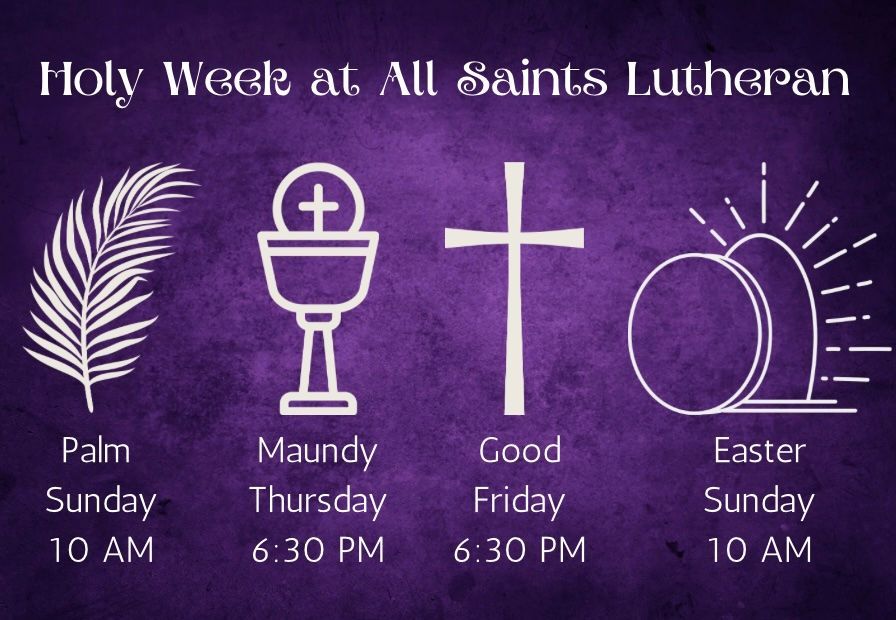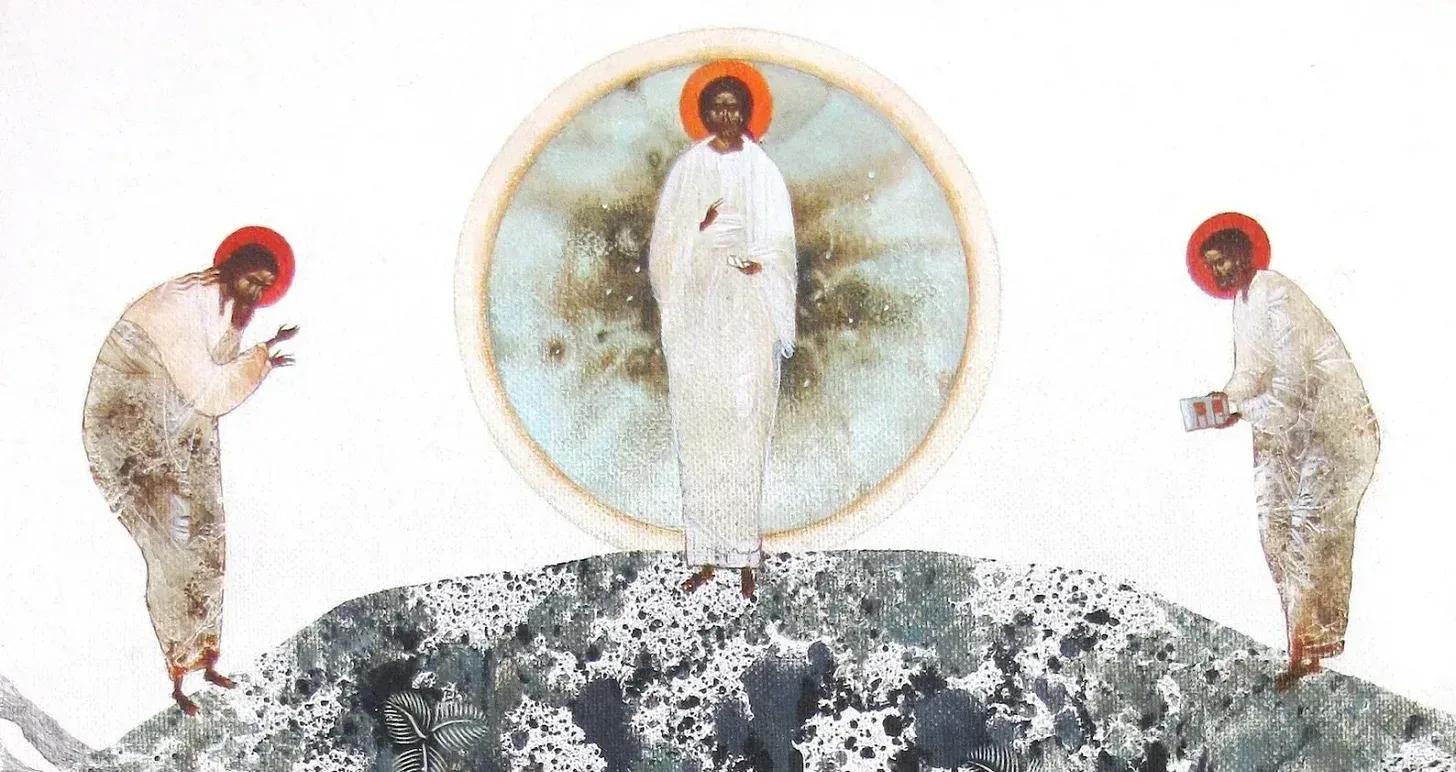Sermon for Transfiguration, Year B, February 11, 2024
This Wednesday is Valentine’s Day,
in addition to being Ash Wednesday.
It also happens to be the 18th anniversary
of my engagement to Pastor Jennifer.
As I have thought about this passage
from the Gospel of Mark,
I have been drawn back,
again and again,
to a day just weeks before Valentine’s Day.
Jennifer and I had spent the winter break apart.
We had been in touch,
by phone and text,
but in those days before Facetime and Zoom,
we had not seen each other.
We had gone into this break
on an uncertain note—
which I will freely admit
(and if I didn’t, Pastor Jennifer would tell you)
was my fault.
I could tell that she was far more certain
about the future of our relationship
than I was.
I didn’t what to lead her on
if this didn’t develop into something more on my end.
So, trying to do the right thing,
I told her about that uncertainty
and asked for a break.
Man, was I stupid.
When we finally met up again after winter break,
the second I saw her,
I understood why poets and artist
talk of sparks and fireworks.
In a split second,
I knew in my bones
that I was looking at my wife.
I made my amends,
and as love keeps no record of wrongs,
we picked up right were we left off.
But that moment
had changed how I saw Jennifer,
how I saw the rest of my life.
It changed how and what I dreamed
about the future.
It changed how I saw everything I had been through
up to this point.
Eighteen years,
one son,
5 degrees,
2 ordinations
and 8 zip codes later,
knowing what I know now,
not only would I still ask,
I would ask sooner.
So, what does any of that have to do
with Mark, Chapter 9?
Good question.
“Six days later,”
says the text.
Six days earlier,
Jesus asked his disciples who people say he is.
There were a lot of answers,
John the Baptizer back from the dead,
Elijah, or one of the prophets.
Jesus asks who they say he is,
and Peter makes his famous confession,
“You are the Christ!”
Jesus then predicts that he will be handed over,
killed,
and on the third day,
rise again.
Peter rebukes him,
and Jesus returns the rebuke.
Now,
six days later,
Jesus takes Peter, James, and John up a high mountain alone
and there he was transfigured.
Now,
many of the other feasts of the liturgical year
seem to carry a clearer story.
Christmas,
sure, I understand birthdays.
Annunciation;
well, I know what an announcement is,
so that makes sense.
But transfiguration
is not a word we use very often,
if ever.
Even if we break the word down to its parts—
“trans-” means to change,
“figure” means a visible representation or form,
“-ation” means the action or process of—
so the action or process of changing one’s visible form?
Yeah, still not much help.
Even the other texts don’t provide much insight.
Elijah is carried to heaven in a chariot of fire?
Really?
II Corinthians talks about the god of this age
vailing the gospel to those who are perishing.
Thanks, Paul.
What are we to make of all of this?
If we look closer,
both the story from II Kings
and the story from Mark
include disciples who don’t want things to change.
Elisha refuses to leave Elijah’s side,
despite the foretelling of his impending death,
until a mysterious light envelops Elijah
and he is gone.
Peter refuses to believe
that Jesus will die,
but Jesus begins to shine with a mysterious light,
flanked by Moses and Elijah,
and an overshadowing voice
calls Jesus “the Beloved”
and commands that they listen to him.
Jesus seemed to them
changed, somehow,
different in this new light.
For Peter, James, and John,
I wonder if this was the moment
when they understood what all the Law and the prophets
had been writing about.
I wonder if in a split second,
they knew in their bones
that they were looking at their God.
I wonder if that moment
had changed how they saw Jesus,
how they saw the rest of their lives.
Did it change how and what they dreamed
about the future?
Did it change how they saw everything they had been through
up to this point?
Was if transfiguration
not a changing of one’s visible form,
but a change in how the beholder
sees the visible form?
I know that Jennifer for me that day
was changed,
not in herself,
not in her form,
but in what she was to me.
For Elisha,
his beloved teacher did not die,
but was swallowed up in light,
carried out of his sight in the white-hot embrace
of God’s own Love.
For Peter, James, and John,
their beloved teacher
suddenly became more clearly visible to them
in a way that it changed how they saw everything else.
For them,
Jesus became the light by which
they could see everything else.
The Transfiguration is not a change of what we see;
the Transfiguration is a change in how we see.
Jesus has come to reconcile heaven and earth,
body and soul,
matter and spirit.
This is the “light of the knowledge
of the glory of God in Christ Jesus,”
the light by which we see everything rightly,
as it is,
for what it is.
Jesus is the light by which we come to understand
the law and the prophets,
heaven and earth,
body and soul,
matter and spirit,
sinners and saints,
are all reconciled to God
in Christ Jesus.
And if Jesus is the light
by which we can see
that God is reconciling all things to God’s self,
then we no longer have to worry about
what God might exclude.
Nor do we have to worry about
what God might include,
like suffering,
like the Cross,
like death and our sin.
Instead,
we are free to rest
in the overshadowing presence of God,
that great cloud of knowing
that surrounds us from without
and arises from within,
that assures us that we too are God’s Beloved,
and calls us to listen,
to await the transfiguring of this reality
until by God’s great Love and great Suffering
we arrive at the transformation
of this reality.
Amen.










